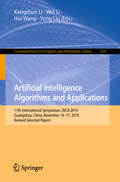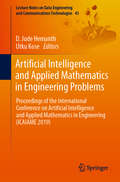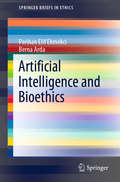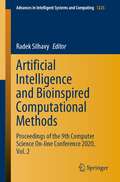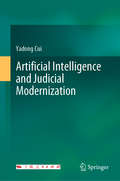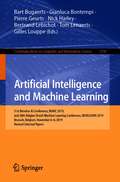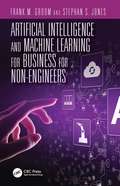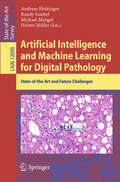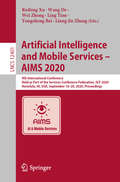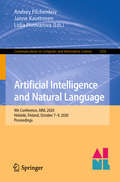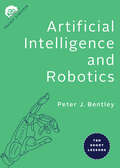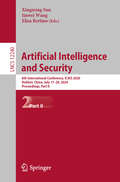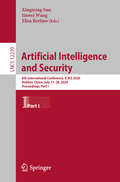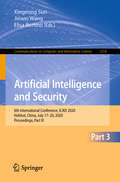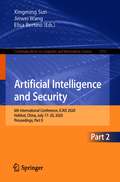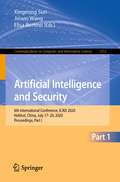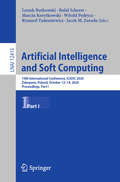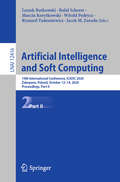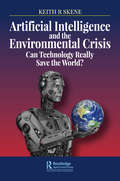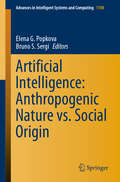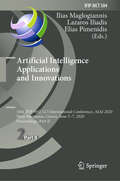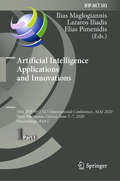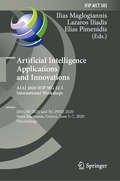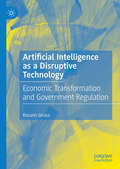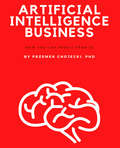- Table View
- List View
Artificial Intelligence Algorithms and Applications: 11th International Symposium, ISICA 2019, Guangzhou, China, November 16–17, 2019, Revised Selected Papers (Communications in Computer and Information Science #1205)
by Kangshun Li Wei Li Hui Wang Yong LiuThis book constitutes the thoroughly refereed proceedings of the 11th International Symposium on Intelligence Computation and Applications, ISICA 2019, held in Guangzhou, China, in November 2019.The 65 papers presented were carefully reviewed and selected from the total of 112 submissions. This volume features the most up-to-date research in evolutionary algorithms, parallel computing and quantum computing, evolutionary multi-objective and dynamic optimization, intelligent multimedia systems, virtualization and AI applications, smart scheduling, intelligent control, big data and cloud computing, deep learning, and hybrid machine learning systems.The papers are organized according to the following topical sections: new frontier in evolutionary algorithms; evolutionary multi-objective and dynamic optimization; intelligent multimedia systems; virtualization and AI applications; smart scheduling; intelligent control; big data and cloud computing; statistical learning.
Artificial Intelligence and Applied Mathematics in Engineering Problems: Proceedings of the International Conference on Artificial Intelligence and Applied Mathematics in Engineering (ICAIAME 2019) (Lecture Notes on Data Engineering and Communications Technologies #43)
by D. Jude Hemanth Utku KoseThis book features research presented at the 1st International Conference on Artificial Intelligence and Applied Mathematics in Engineering, held on 20–22 April 2019 at Antalya, Manavgat (Turkey). In today’s world, various engineering areas are essential components of technological innovations and effective real-world solutions for a better future. In this context, the book focuses on problems in engineering and discusses research using artificial intelligence and applied mathematics. Intended for scientists, experts, M.Sc. and Ph.D. students, postdocs and anyone interested in the subjects covered, the book can also be used as a reference resource for courses related to artificial intelligence and applied mathematics.
Artificial Intelligence and Bioethics (SpringerBriefs in Ethics)
by Perihan Elif Ekmekci Berna ArdaThis book explores major bioethical issues emerging from the development and use of artificial intelligence in medical settings. The authors start by defining the past, present and future of artificial intelligence in medical settings and then proceed to address the resulting common and specific bioethical inquiries. The book discusses bioethical inquiries in two separate sets. The first set is comprised of ontological discussions mainly focusing on personhood and being an ethical agent of an artefact. The second set discusses bioethical issues resulting from the use of artificial intelligence. It focuses particularly on the area of artificial intelligence use in medicine and health services. It addresses the main challenges by considering fundamental principles of medical ethics, including confidentiality, privacy, compassion, veracity and fidelity. Finally, the authors discuss the ethical implications of involvement of artificial intelligence agents in patient care by expanding on communication skills in a case-based approach. The book is of great interest to ethicists, medical professionals, academicians, engineers and scientists working with artificial intelligence.
Artificial Intelligence and Bioinspired Computational Methods: Proceedings of the 9th Computer Science On-line Conference 2020, Vol. 2 (Advances in Intelligent Systems and Computing #1225)
by Radek SilhavyThis book gathers the refereed proceedings of the Artificial Intelligence and Bioinspired Computational Methods Section of the 9th Computer Science On-line Conference 2020 (CSOC 2020), held on-line in April 2020.Artificial intelligence and bioinspired computational methods now represent crucial areas of computer science research. The topics presented here reflect the current discussion on cutting-edge hybrid and bioinspired algorithms and their applications.
Artificial Intelligence and Judicial Modernization
by Yadong CuiThis book comprehensively describes the status quo of artificial intelligence technology applications in the judicial field in China. Written by Cui Yadong, the former President of Shanghai Senior People's Court, it is divided into three parts: the first part focuses mainly on the theoretical issues related to artificial intelligence and judicial applications. The second part highlights practical aspects, discussing the research and development process, the implementation of the"206 system" and the major breakthroughs. The third part then addresses lessons learned and the thinking, particularly the thinking on "building the future rule of law of artificial intelligence", a new topic that responds to people's concerns about the risks and challenges of the development of artificial intelligence. In this context, the book argues that the judicial task is twofold: On the one hand, it should actively promote the integration and application of AI in the judiciary, judicial intelligence, and judicial modernization. On the other hand, it should encourage the construction of a future rule of law system of artificial intelligence, highlight the role of the judiciary in dealing with future risks and challenges, bring the development of artificial intelligence into line with the rule of law, and use the rule of law to promote, standardize and guarantee the safe, reliable and controllable development of artificial intelligence.
Artificial Intelligence and Machine Learning: 31st Benelux AI Conference, BNAIC 2019, and 28th Belgian-Dutch Machine Learning Conference, BENELEARN 2019, Brussels, Belgium, November 6-8, 2019, Revised Selected Papers (Communications in Computer and Information Science #1196)
by Bart Bogaerts Gianluca Bontempi Pierre Geurts Nick Harley Bertrand Lebichot Tom Lenaerts Gilles LouppeThis book contains a selection of the best papers of the 31st Benelux Conference on Artificial Intelligence, BNAIC 2019, and 28th Belgian Dutch Machine Learning Conference, BENELEARN 2019, held in Brussels, Belgium in November 2019. The 11 papers presented in this volume were carefully reviewed and selected from 50 regular submissions. They address various aspects of artificial intelligence such as natural language processing, agent technology, game theory, problem solving, machine learning, human-agent interaction, AI and education, and data analysis.
Artificial Intelligence and Machine Learning for Business for Non-Engineers (Technology for Non-Engineers)
by Stephan S. Jones Frank M. GroomThe next big area within the information and communication technology field is Artificial Intelligence (AI). The industry is moving to automate networks, cloud-based systems (e.g., Salesforce), databases (e.g., Oracle), AWS machine learning (e.g., Amazon Lex), and creating infrastructure that has the ability to adapt in real-time to changes and learn what to anticipate in the future. It is an area of technology that is coming faster and penetrating more areas of business than any other in our history. AI will be used from the C-suite to the distribution warehouse floor. Replete with case studies, this book provides a working knowledge of AI’s current and future capabilities and the impact it will have on every business. It covers everything from healthcare to warehousing, banking, finance and education. It is essential reading for anyone involved in industry.
Artificial Intelligence and Machine Learning for Digital Pathology: State-of-the-Art and Future Challenges (Lecture Notes in Computer Science #12090)
by Andreas Holzinger Randy Goebel Michael Mengel Heimo MüllerData driven Artificial Intelligence (AI) and Machine Learning (ML) in digital pathology, radiology, and dermatology is very promising. In specific cases, for example, Deep Learning (DL), even exceeding human performance. However, in the context of medicine it is important for a human expert to verify the outcome. Consequently, there is a need for transparency and re-traceability of state-of-the-art solutions to make them usable for ethical responsible medical decision support. Moreover, big data is required for training, covering a wide spectrum of a variety of human diseases in different organ systems. These data sets must meet top-quality and regulatory criteria and must be well annotated for ML at patient-, sample-, and image-level. Here biobanks play a central and future role in providing large collections of high-quality, well-annotated samples and data. The main challenges are finding biobanks containing ‘‘fit-for-purpose’’ samples, providing quality related meta-data, gaining access to standardized medical data and annotations, and mass scanning of whole slides including efficient data management solutions.
Artificial Intelligence and Mobile Services – AIMS 2020: 9th International Conference, Held as Part of the Services Conference Federation, SCF 2020, Honolulu, HI, USA, September 18-20, 2020, Proceedings (Lecture Notes in Computer Science #12401)
by Ruifeng Xu Wang De Wei Zhong Ling Tian Yongsheng Bai Liang-Jie ZhangThis book constitutes the proceedings of the 9th International Conference on Artificial Intelligence and Mobile Services, AIMS 2020, held as part of SCF 2020, during September 18-20, 2020. The conference was planned to take place in Honolulu, HI, USA and was changed to a virtual format due to the COVID-19 pandemic. The 11 full and 2 short papers presented were carefully reviewed and selected from 42 submissions. They cover topics in AI Modeling, AI Analysis, AI and Mobile Applications, AI Architecture, AI Management, AI Engineering, Mobile backend as a service (MBaaS), User experience of AI and mobile services.
Artificial Intelligence and Natural Language: 9th Conference, AINL 2020, Helsinki, Finland, October 7–9, 2020, Proceedings (Communications in Computer and Information Science #1292)
by Andrey Filchenkov Janne Kauttonen Lidia PivovarovaThis book constitutes the refereed proceedings of the 9th Conference on Artificial Intelligence and Natural Language, AINL 2020, held in Helsinki, Finland, in October 2020. The 11 revised full papers and 3 short papers were carefully reviewed and selected from 36 submissions. Additionally, the volume presents 1 shared task paper. The volume presents recent research in areas of of text mining, speech technologies, dialogue systems, information retrieval, machine learning, articial intelligence, and robotics.
Artificial Intelligence and Robotics: Ten Short Lessons (Pocket Einstein Series)
by Peter J. BentleyAn expert introduction to the fascinating world of robotics, artificial intelligence, and how machines learn.In Artificial Intelligence and Robotics: Ten Short Lessons, leading expert Peter J. Bentley breaks down the fast-moving world of computers into ten pivotal lessons, presenting the reader with the essential information they need to get to understand our most powerful technology and its remarkable implications for our species.From the origins and motivation behind the birth of AI and robotics to using smart algorithms that allow us to build good robots, from the technologies that enable computers to understand a huge range of sensory information, including language and communication, to the challenges of emotional intelligence, unpredictable environments, and imagination in artificial intelligence, this is a cutting-edge, expert-led guide for curious minds. Packed full of easy-to-understand diagrams, pictures, and fact boxes, these ten lessons cover all the basics, as well as the latest understanding and developments, to enlighten the nonscientist.About the series: The Pocket Einstein series is a collection of essential pocket-sized guides for anyone looking to understand a little more about some of the most important and fascinating areas of science in the twenty-first century. Broken down into ten simple lessons and written by leading experts in their field, the books reveal the ten most important takeaways from those areas of science you've always wanted to know more about.
Artificial Intelligence and Security: 6th International Conference, ICAIS 2020, Hohhot, China, July 17–20, 2020, Proceedings, Part II (Lecture Notes in Computer Science #12240)
by Xingming Sun Jinwei Wang Elisa BertinoThis two-volume set LNCS 12239-12240 constitutes the refereed proceedings of the 6th International Conference on Artificial Intelligence and Security, ICAIS 2020, which was held in Hohhot, China, in July 2020. The conference was formerly called “International Conference on Cloud Computing and Security” with the acronym ICCCS. The total of 142 full papers presented in this two-volume proceedings was carefully reviewed and selected from 1064 submissions. The papers were organized in topical sections as follows: Part I: Artificial intelligence and internet of things. Part II: Internet of things, information security, big data and cloud computing, and information processing.
Artificial Intelligence and Security: 6th International Conference, ICAIS 2020, Hohhot, China, July 17–20, 2020, Proceedings, Part I (Lecture Notes in Computer Science #12239)
by Xingming Sun Jinwei Wang Elisa BertinoThis two-volume set LNCS 12239-12240 constitutes the refereed proceedings of the 6th International Conference on Artificial Intelligence and Security, ICAIS 2020, which was held in Hohhot, China, in July 2020. The conference was formerly called “International Conference on Cloud Computing and Security” with the acronym ICCCS. The total of 142 full papers presented in this two-volume proceedings was carefully reviewed and selected from 1064 submissions. The papers were organized in topical sections as follows: Part I: Artificial intelligence and internet of things. Part II: Internet of things, information security, big data and cloud computing, and information processing.
Artificial Intelligence and Security: 6th International Conference, ICAIS 2020, Hohhot, China, July 17–20, 2020, Proceedings, Part III (Communications in Computer and Information Science #1254)
by Xingming Sun Jinwei Wang Elisa BertinoThe 3-volume set CCIS 1252 until CCIS 1254 constitutes the refereed proceedings of the 6th International Conference on Artificial Intelligence and Security, ICAIS 2020, which was held in Hohhot, China, in July 2020. The conference was formerly called “International Conference on Cloud Computing and Security” with the acronym ICCCS. The total of 178 full papers and 8 short papers presented in this 3-volume proceedings was carefully reviewed and selected from 1064 submissions. The papers were organized in topical sections as follows: Part I: artificial intelligence; Part II: artificial intelligence; Internet of things; information security; Part III: information security; big data and cloud computing; information processing.
Artificial Intelligence and Security: 6th International Conference, ICAIS 2020, Hohhot, China, July 17–20, 2020, Proceedings, Part II (Communications in Computer and Information Science #1253)
by Elisa Bertino Xingming Sun Jinwei WangThe 3-volume set CCIS 1252 until CCIS 1254 constitutes the refereed proceedings of the 6th International Conference on Artificial Intelligence and Security, ICAIS 2020, which was held in Hohhot, China, in July 2020. The conference was formerly called “International Conference on Cloud Computing and Security” with the acronym ICCCS. The total of 178 full papers and 8 short papers presented in this 3-volume proceedings was carefully reviewed and selected from 1064 submissions. The papers were organized in topical sections as follows: Part I: artificial intelligence; Part II: artificial intelligence; Internet of things; information security; Part III: information security; big data and cloud computing; information processing.
Artificial Intelligence and Security: 6th International Conference, ICAIS 2020, Hohhot, China, July 17–20, 2020, Proceedings, Part I (Communications in Computer and Information Science #1252)
by Elisa Bertino Xingming Sun Jinwei WangThe 3-volume set CCIS 1252 until CCIS 1254 constitutes the refereed proceedings of the 6th International Conference on Artificial Intelligence and Security, ICAIS 2020, which was held in Hohhot, China, in July 2020. The conference was formerly called “International Conference on Cloud Computing and Security” with the acronym ICCCS. The total of 178 full papers and 8 short papers presented in this 3-volume proceedings was carefully reviewed and selected from 1064 submissions. The papers were organized in topical sections as follows: Part I: artificial intelligence; Part II: artificial intelligence; Internet of things; information security; Part III: information security; big data and cloud computing; information processing.
Artificial Intelligence and Soft Computing: 19th International Conference, ICAISC 2020, Zakopane, Poland, October 12-14, 2020, Proceedings, Part I (Lecture Notes in Computer Science #12415)
by Leszek Rutkowski Rafał Scherer Marcin Korytkowski Witold Pedrycz Ryszard Tadeusiewicz Jacek M. ZuradaThe two-volume set LNCS 12415 and 12416 constitutes the refereed proceedings of of the 19th International Conference on Artificial Intelligence and Soft Computing, ICAISC 2020, held in Zakopane, Poland*, in October 2020.The 112 revised full papers presented were carefully reviewed and selected from 265 submissions. The papers included in the first volume are organized in the following six parts: neural networks and their applications; fuzzy systems and their applications; evolutionary algorithms and their applications; pattern classification; bioinformatics, biometrics and medical applications; artificial intelligence in modeling and simulation.The papers included in the second volume are organized in the following four parts: computer vision, image and speech analysis; data mining; various problems of artificial intelligence; agent systems, robotics and control.*The conference was held virtually due to the COVID-19 pandemic.
Artificial Intelligence and Soft Computing: 19th International Conference, ICAISC 2020, Zakopane, Poland, October 12-14, 2020, Proceedings, Part II (Lecture Notes in Computer Science #12416)
by Leszek Rutkowski Rafał Scherer Marcin Korytkowski Witold Pedrycz Ryszard Tadeusiewicz Jacek M. ZuradaThe two-volume set LNCS 12415 and 12416 constitutes the refereed proceedings of of the 19th International Conference on Artificial Intelligence and Soft Computing, ICAISC 2020, held in Zakopane, Poland*, in October 2020.The 112 revised full papers presented were carefully reviewed and selected from 265 submissions. The papers included in the first volume are organized in the following six parts: neural networks and their applications; fuzzy systems and their applications; evolutionary algorithms and their applications; pattern classification; bioinformatics, biometrics and medical applications; artificial intelligence in modeling and simulation.The papers included in the second volume are organized in the following four parts: computer vision, image and speech analysis; data mining; various problems of artificial intelligence; agent systems, robotics and control.*The conference was held virtually due to the COVID-19 pandemic.
Artificial Intelligence and the Environmental Crisis: Can Technology Really Save the World?
by Keith Ronald SkeneA radical and challenging book which argues that artificial intelligence needs a completely different set of foundations, based on ecological intelligence rather than human intelligence, if it is to deliver on the promise of a better world. This can usher in the greatest transformation in human history, an age of re-integration. Our very existence is dependent upon our context within the Earth System, and so, surely, artificial intelligence must also be grounded within this context, embracing emergence, interconnectedness and real-time feedback. We discover many positive outcomes across the societal, economic and environmental arenas and discuss how this transformation can be delivered. Key Features: Identifies a key weakness in current AI thinking, that threatens any hope of a better world. Highlights the importance of realizing that systems theory is an essential foundation for any technology that hopes to positively transform our world. Emphasizes the need for a radical new approach to AI, based on ecological systems. Explains why ecosystem intelligence, not human intelligence, offers the best framework for AI. Examines how this new approach will impact on the three arenas of society, environment and economics, ushering in a new age of re-integration.
Artificial Intelligence: Anthropogenic Nature vs. Social Origin (Advances in Intelligent Systems and Computing #1100)
by Elena G. Popkova Bruno S. SergiThis book presents advanced research studies on the topic of artificial intelligence as a component of social and economic relations and processes. It gathers research papers from the International Research-to-Practice Conference “The 21st Century from the Positions of Modern Science: Intellectual, Digital and Innovative Aspects” (May 23–24, 2019, Nizhny Novgorod, Russia) and the International Research-to-Practice Conference “Economics of Pleasure: a Science of Enjoying Economic Activities” (October 3–5, 2019, Prague, Czech Republic). Both conferences were organized by the Autonomous Non-Profit Organization “Institute of Scientific Communications” (Volgograd). What sets this book apart from other publications on the topic of artificial intelligence is that it approaches AI not as a technological tool, but as an economic entity. Bringing together papers by representatives of various fields of social and human knowledge, it systematically reflects on various economic, social, and legal aspects of the creation, application, and development of artificial intelligence. Given the multidisciplinary nature of its content, the book will appeal to a broad target audience, including those engaged in developing AI (scientific research institutes and universities), and Industry 4.0 enterprises interested in its implementation, as well as state regulators for the digital economy.
Artificial Intelligence Applications and Innovations: 16th IFIP WG 12.5 International Conference, AIAI 2020, Neos Marmaras, Greece, June 5–7, 2020, Proceedings, Part II (IFIP Advances in Information and Communication Technology #584)
by Ilias Maglogiannis Lazaros Iliadis Elias PimenidisThis 2 volume-set of IFIP AICT 583 and 584 constitutes the refereed proceedings of the 16th IFIP WG 12.5 International Conference on Artificial Intelligence Applications and Innovations, AIAI 2020, held in Neos Marmaras, Greece, in June 2020.*The 70 full papers and 5 short papers presented were carefully reviewed and selected from 149 submissions. They cover a broad range of topics related to technical, legal, and ethical aspects of artificial intelligence systems and their applications and are organized in the following sections:Part I: classification; clustering - unsupervised learning -analytics; image processing; learning algorithms; neural network modeling; object tracking - object detection systems; ontologies - AI; and sentiment analysis - recommender systems. Part II: AI ethics - law; AI constraints; deep learning - LSTM; fuzzy algebra - fuzzy systems; machine learning; medical - health systems; and natural language.*The conference was held virtually due to the COVID-19 pandemic.
Artificial Intelligence Applications and Innovations: 16th IFIP WG 12.5 International Conference, AIAI 2020, Neos Marmaras, Greece, June 5–7, 2020, Proceedings, Part I (IFIP Advances in Information and Communication Technology #583)
by Ilias Maglogiannis Lazaros Iliadis Elias PimenidisThis 2 volume-set of IFIP AICT 583 and 584 constitutes the refereed proceedings of the 16th IFIP WG 12.5 International Conference on Artificial Intelligence Applications and Innovations, AIAI 2020, held in Neos Marmaras, Greece, in June 2020.*The 70 full papers and 5 short papers presented were carefully reviewed and selected from 149 submissions. They cover a broad range of topics related to technical, legal, and ethical aspects of artificial intelligence systems and their applications and are organized in the following sections:Part I: classification; clustering - unsupervised learning -analytics; image processing; learning algorithms; neural network modeling; object tracking - object detection systems; ontologies - AI; and sentiment analysis - recommender systems. Part II: AI ethics - law; AI constraints; deep learning - LSTM; fuzzy algebra - fuzzy systems; machine learning; medical - health systems; and natural language.*The conference was held virtually due to the COVID-19 pandemic.
Artificial Intelligence Applications and Innovations. AIAI 2020 IFIP WG 12.5 International Workshops: MHDW 2020 and 5G-PINE 2020, Neos Marmaras, Greece, June 5–7, 2020, Proceedings (IFIP Advances in Information and Communication Technology #585)
by Ilias Maglogiannis Lazaros Iliadis Elias PimenidisThis book constitutes the refereed proceedings of two International Workshops held as parallel events of the 16th IFIP WG 12.5 International Conference on Artificial Intelligence Applications and Innovations, AIAI 2020, in Neos Marmaras, Greece, in June 2020: the 9th Mining Humanistic Data Workshop, MHDW 2020, and the 5th Workshop on 5G-Putting Intelligence to the Network Edge, 5G-PINE 2020.* The 6 full papers and 3 short papers presented at MHDW 2020 were carefully reviewed and selected from 16 submissions; out of the 23 papers submitted to 5G-PINE 2020, 11 were accepted as full papers and 1 as a short paper. The MHDW papers focus on topics such as recommendation systems, sentiment analysis, pattern recognition, data mining, and time series. The papers presented at 5G-PINE focus on the latest AI applications in the telecommunication industry and deal with topics such as the Internet of Things, intelligence fusion in 5G networks, and 5G media.*The workshops were held virtually due to the COVID-19 pandemic.
Artificial Intelligence as a Disruptive Technology: Economic Transformation and Government Regulation
by Rosario GirasaArtificial intelligence (AI) is the latest technological evolution which is transforming the global economy and is a major part of the “Fourth Industrial Revolution.” This book covers the meaning, types, subfields and applications of AI, including U.S. governmental policies and regulations, ethical and privacy issues, particularly as they pertain and affect facial recognition programs and the Internet-of Things (IoT). There is a lengthy analysis of bias, AI’s effect on the current and future job market, and how AI precipitated fake news. In addition, the text covers basics of intellectual property rights and how AI will transform their protection. The author then moves on to explore international initiatives from the European Union, China’s New Generation Development Plan, other regional areas, and international conventions. The book concludes with a discussion of super intelligence and the question and applicability of consciousness in machines. The interdisciplinary scope of the text will appeal to any scholars, students and general readers interested in the effects of AI on our society, particularly in the fields of STS, economics, law and politics.
Artificial Intelligence Business: Expert tips and techniques for how to profit from AI
by Przemek ChojeckiThe concise guide to artificial intelligence for business people and commercially oriented data scientists Key Features • Find out how artificial intelligence is shaping the future of businesses • Discover how AI influences the society and its politics and economy • Explore the future of AI and its applications Book Description We're living in revolutionary times. Artificial intelligence is changing how the world operates and it determines how smooth certain processes are. For instance, when you go on a holiday, multiple services allow you to find the most convenient flights and the best hotels, you get personalized suggestions on what you might want to see, and you go to the airport via one of the ride-sharing apps. At each of these steps, AI algorithms are at work for your convenience. This book will guide you through everything, from what AI is to how it influences our economy and society. The book starts with an introduction to artificial intelligence and machine learning, and explains the importance of AI in the modern world. You'll explore how start-ups make key decisions with AI and how AI plays a major role in boosting businesses. Next, you'll find out how media companies use image generation techniques to create engaging content. As you progress, you'll explore how text generation and AI chatbot models simplify our daily lives. Toward the end, you'll understand the importance of AI in the education and healthcare sectors, and realize the risks associated with AI and how we can leverage AI effectively to help us in the future. By the end of this book, you'll have learned how machine learning works and have a solid understanding of the recent business applications of AI. What you will learn • Find out how AI helps in building innovative cultures in enterprises • Understand how AI boosts start-ups • Discover modern AI trends in the field of manufacturing and logistics • Explore the benefits of text and image generation applications • Study popular machine learning trends and their usage • Uncover the uses of AI in politics and society Who this book is for This book is for artificial intelligence enthusiasts or anyone with a business background who wants to learn how AI can scale up businesses.
